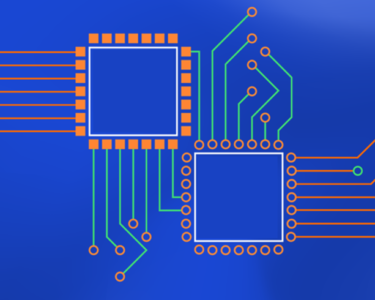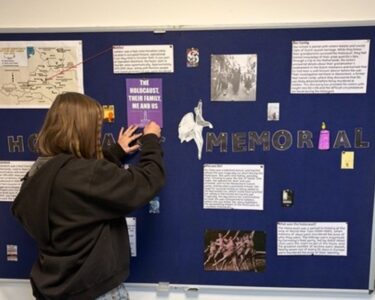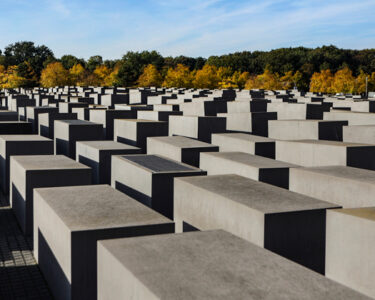Blog post by Elizabeth Hankins
“The tome might feel daunting were the lure of its contents not so remarkable. The report’s sheer weight and thickness promises information in spades – sweeping , long-awaited research abridged into the orthodoxy of nearly 300 8 ½ x11 pages brimming with prolific charts, infographics, and photos amid urgent findings about student understandings of the Holocaust.
The read is compelling, something of a panoramic journey into classrooms across England wherein students articulate their knowledge and understandings about the Holocaust. Who do they identify as victims of this ineffably sinister event that claimed two-thirds of European Jewry under cover of war in just a few short years? Do they understand how extensive and strategic this systematic destruction plan was, the complex web of perpetrators and bystanders necessary to carry out such universal evil? Could they name genocidaires, those architecting plans that would eliminate from our planet so much of a human race? What was the relationship between World War II and the Holocaust? Where were locations of mass killings?
These are just a few of the queries reflected in the University College of London’s What Do Students Know and Understand about the Holocaust?, the world’s largest study of its kind condensed in a sprawling chronicle holding responses of more than 9,500 students across all years of secondary school in England. And while findings of what is known and understood about the Holocaust’s sustained, grand-scale annihilation were perhaps equal parts expected and unforeseen, a few undergirding themes that support and go beyond conclusions and recommendations might be extracted. First, comprehensive study of the Holocaust is crucial, not only in offering students an understanding of this darkly unique catastrophe blotting human history, but in helping them carve out an ethos of moral, ethical and spiritual responsibility to our human family. To be certain, this epic genocide is ‘emblematic of man’s inhumanity to man’, but the post-World War II pledge of ‘never again’ has only come to mean ‘until the next time’ if we take into account Cambodia, Bosnia-Herzegovina, Rwanda, South Sudan, Darfur and more. Sadly, history has repeated itself, and the fact that genocidal patterns and metrics do not entirely replicate that of the Holocaust does not minimize the breadth of wholesale destruction accomplished in the regions of which it was intended. Whatever else genocide is, it’s intensely personal because it destroys individual and collective life, it steals human security and kills hope of a future. So yes, deep and broad knowledge of the Holocaust matters greatly.
But just as important as facts about historical timelines, perpetrators, meanings of dread words like ‘Kristallnacht’, ‘antisemitism’, Einsatzgruppen, etc., is teaching the truth that genocide belongs as much to the present as to times past – and avoiding cycles of race killing entails personal engagement, advocacy, action. Further, such commitment to be present and to act will be the product of something that sounds, at first pass, clichéd: caring. Yet to stand against constructs comprising genocide – hate, prejudice, impunity, greed, etc. – caring would be absolutely fundamental to making an end of mass atrocities. Caring would be the first-line antidote to apathy, which is perhaps the mother of inaction and her subsequent child, impunity.
The Holocaust may be a ‘civilizational break’ as Dan Diner posits. To wrestle fully with its multidimensional truths and injustices brings the learner to a knowledge, and hopefully deeper understanding, of historical facts that live in infamy. But perhaps the impending civilizational breakdown is this: if we fail to study genocide as present-tense, born of ongoing structurally violent social, economic and political constructs and policies that give way to direct violence and beyond, if we do not fully engage with preventive measures such as peace education and practices, Holocaust instruction and ensuing monuments erected to it will only stand as beacons of rending loss that fail to connect history to present and future. The tragedy of this is profound, far-reaching: Students may gain intellectual knowledge of subject matter without encountering a sense of responsibility and empowerment to forge values that can transform the spheres they inhabit.
It would seem education is most powerful if guided by principles redemptive in nature with the ability to positively impact human life. And while there is nothing at all redeeming about the staggering demise of the Holocaust, there came the aspiration that such suffering might not have been borne again. There was longing that the human family would not endure all over the targeting of a race, religion, ethnicity or nationality for extermination. This was at the heart of the 1948 Genocide Convention. Such hope resounded in the formation of the United Nations and within the Universal Declaration of Human Rights which offers our world community the basis for international law. But while we have seen – and continue to see – repeated violent cycles and stages of genocides that have culminated in mass killings, gross human rights abuses and crimes against humanity, there is yet hope that if we see and teach genocide as living and breathing like those who perpetrate it, if we teach it in ways where students grasp and might actively choose to reject inaction in favour of caring about the equality, dignity and security of the human race and experience, we may yet face history differently and embrace a future where genocide might belong to the past.
The portal to such a high-stakes promise is no obscure gateway. Rather, the path seems clear and indivisible from the context of the extraordinary-ordinary classrooms where students return day after day to learn, to process intellectual data into substantive, life-altering values. Such learning about genocide would best begin here with a thorough understanding of the Holocaust’s nefarious anatomy, its depraved intricacies.
UCL’s What Do Students Know and Understand about the Holocaust? is an incisive, strategic tool in the postmodern narrative of preventing genocide and such dark ideologies and constructs preceding it. What appears a copious report about Holocaust information known and grasped by students is as much a clarion directive and reinforcement for the Centre’s ongoing commitment to continuing professional development programmes surrounding this dread event’s ‘particular nature and historical distinctiveness’. Such programming equips educational leaders with a synthesis of innovative, comprehensive and thoughtful learning that, in turn, allows students to explore depth and breadth of historical complexities ‘beyond easy moral lessons’ to engage with ‘the deeply unsettling flaws in our modern world from which the Holocaust sprang’. Put simply, if meaning is to be extrapolated from the atrocities of the Holocaust, students require ‘a robust and secure understanding of it as a historical phenomenon’.
Among its other objectives, UCL’s Centre for Holocaust Education exists to build bridges and close gaps. Both of these are deeply noble, essential to holistic learning and intentional-ethical world citizenry. From plans for further qualitative research to imbuing mechanisms such as ad hoc learning via spiral curriculum to ensuring coordination of continuing education processes with recommendations of the Prime Minister’s Holocaust Commission, UCL’s Centre for Holocaust Education is establishing new, complete pathways to educate and inspire leaders and learners across generations. Such balance of support and catalyzing, striving and connecting is helping engender skilled, reflective and inventive teaching that inspires and empowers young people to critically think and etch out a world where justice and peace might yet exist for all people.”
Elizabeth Hankins is an author, peace worker and human rights advocate. Her second book, I Learned a New Word Today…Genocide (Key Publishing, October 2009), an educational young adult novel exploring major genocides of the twentieth century, is used in the United Kingdom as a historical primer introducing genocide. Elizabeth has a Masters degree in peace and conflict studies from the University of Sydney in Australia and lives in Houston, Texas with her family. Together with a team of friends and colleagues committed to peace and development in the nation of South Sudan, Elizabeth founded Sister Effect (www.sistereffect.org) and serves as the organization’s executive director. She is convinced that ‘homegrown peace’ – local people building peace from the grassroots up – is the key to South Sudan’s national unity, healing and reconciled relationships.
More information about author, activist and humanitarian Elizabeth Hankins can be found via: http://www.thecalling-novel.com/Book.aspx
The UCL Centre for Holocaust Education can be read in full here.



